Connecting NC State courses with the arts: University Theatre
Curricular Connections Update
As we navigate a staff transition as of January 2025, the Curricular Connections webpages will be temporarily paused. However, we remain committed to supporting your integration of the arts into your courses and programs.
For a full list of Spring 2025 Curricular Connections opportunities, please refer to the PDF document here.
Thank you for your understanding and patience during this time. For any immediate questions or assistance, please contact artsncstate@ncsu.edu.
Fall 2024
Thompson Hall
Mr. Burns, a Post-Electric Play
SHOW DATES: Oct. 24-27, 30-Nov. 3, 2024
Supertitle Dates: Oct. 25, 27, 31 & Nov. 2
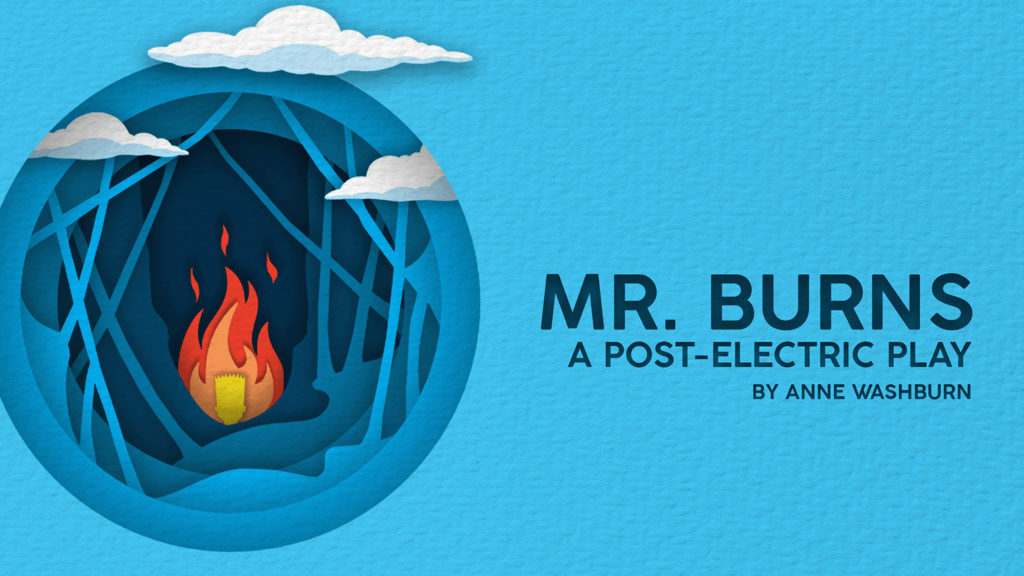
“Mr. Burns: A Post-Electric Play” by Anne Washburn is a compelling and thought-provoking work that examines the intersection of popular culture, storytelling, and societal collapse. The play’s structure and themes offer rich connections to a variety of college courses.
Thematic connections include:
Theater Studies: For students in theater or dramatic arts programs, “Mr. Burns” provides an interesting case study in post-apocalyptic drama and the evolution of narrative forms. The play’s unique structure, with its first act set immediately after a catastrophic event and subsequent acts exploring how the story of “The Simpsons” transforms over time, challenges conventional storytelling and staging techniques.
Literature and Drama: In literature or drama courses, “Mr. Burns” can be analyzed for its exploration of memory, myth, and the power of storytelling. The play’s use of a popular television show as a cultural touchstone allows for discussions on how narratives evolve and are preserved through different lenses over time.
Cultural Studies: For students studying cultural studies, the play offers a lens through which to examine the role of pop culture in shaping collective memory and identity. The way “The Simpsons” is reinterpreted in a post-apocalyptic world provides insight into how culture is transmitted and transformed across generations.
Media Studies: In media studies courses, “Mr. Burns” can be used to explore the impact of media on society and how media artifacts (like television shows) can become significant cultural symbols. The play’s depiction of how “The Simpsons” becomes a mythologized narrative reflects on media’s role in shaping collective consciousness.
Sociology: For sociology students, the play can be a springboard for discussing societal collapse and the role of communal narratives in rebuilding social structures. It raises questions about what stories and cultural references people cling to in times of crisis and how they contribute to social cohesion and identity.
Performance Studies: In performance studies, “Mr. Burns” offers an opportunity to examine how performance and audience engagement evolve in response to different contexts. The play’s blend of theatrical elements with a meta-theatrical exploration of performance as a means of cultural preservation can be an intriguing topic.
Environmental Studies: For students focused on environmental studies or climate change, the play’s setting in a post-apocalyptic world can be analyzed for its commentary on environmental catastrophe and its effects on human culture and behavior.
Specific Course Connections
- AEC 400: Applied Ecology
- ARS 354: The Arts and the Sacred
- CE 373: Fundamentals of Environmental Engineering
- COM 257: Media History and Theory
- COM 436: Environmental Communication
- HI 305: Frauds and Mysteries of the Past
- HI 463: Topics in History and Memory
- THE 103: Introduction to Theatre
- THE 203: Theory and Practice of Acting
Teletype
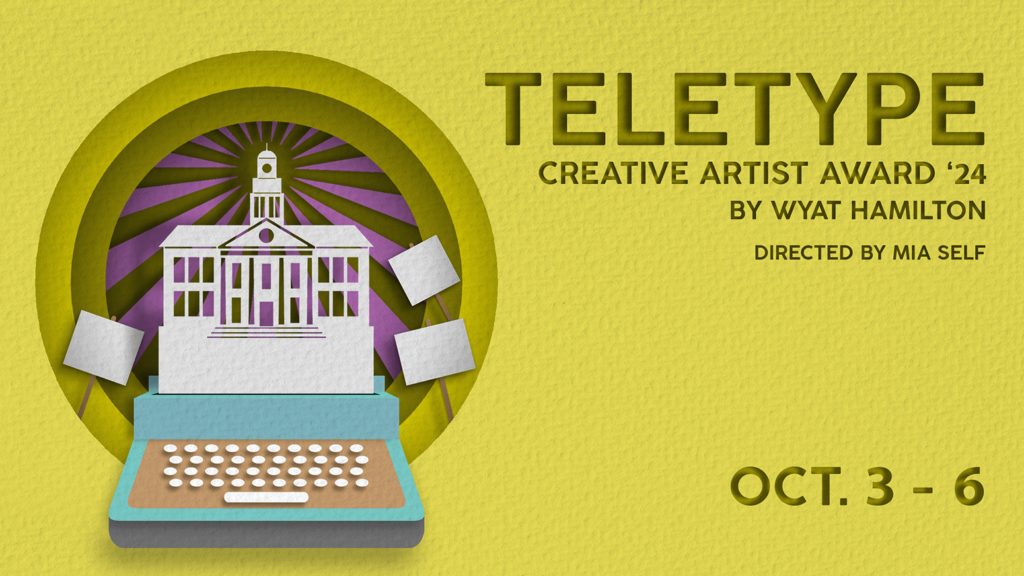
Winner of the 2024 Creative Artist Award in Theatre. In autumn 1969, a Charleston State Technical University journalism student exposes campus fiscal mismanagement. The ensuing academic year brings struggles with the Vietnam War, the draft, the Kent State Massacre, and personal dilemmas involving research ethics, relationships, and community obligations.
Thematic connections include:
- Journalism and Media Studies
- Focuses on investigative journalism, media ethics, and the role of media in society.
- American History
- Covers key historical events and social movements of the 1960s, including the Vietnam War and student protests.
- Political Science
- Explores political movements, student activism, and government responses to social unrest.
- Ethics in Research
- Examines ethical considerations in journalism and academic research.
- Social Justice and Activism
- Studies the role of activism in addressing social issues and injustices.
- Contemporary American Politics
- Investigates political issues and conflicts during the late 1960s and their impact on society.
- Communication Studies
- Looks at how communication methods and media shape public perception and discourse.
- History of Higher Education
- Explores the development and challenges of universities, including student protests and administrative issues.
- Conflict Resolution and Mediation
- Focuses on strategies for managing and resolving conflicts, relevant to personal and institutional disputes.
Specific Course Connections
- AEC 400: Applied Ecology
- ARS 354: The Arts and the Sacred
- CE 373: Fundamentals of Environmental Engineering
- COM 257: Media History and Theory
- COM 436: Environmental Communication
- HI 305: Frauds and Mysteries of the Past
- HI 463: Topics in History and Memory
- THE 103: Introduction to Theatre
- THE 203: Theory and Practice of Acting
Fall 2023
Peter and the Starcatcher
Oct. 19-22, 25-29
Titmus Theatre
Directed by Mia Self
Peter and the Starcatcher” is a play based on the 2004 novel of the same name by Dave Barry and Ridley Pearson. The play, which serves as a prequel to J.M. Barrie’s “Peter and Wendy” (commonly known as “Peter Pan”), explores several themes throughout its narrative.
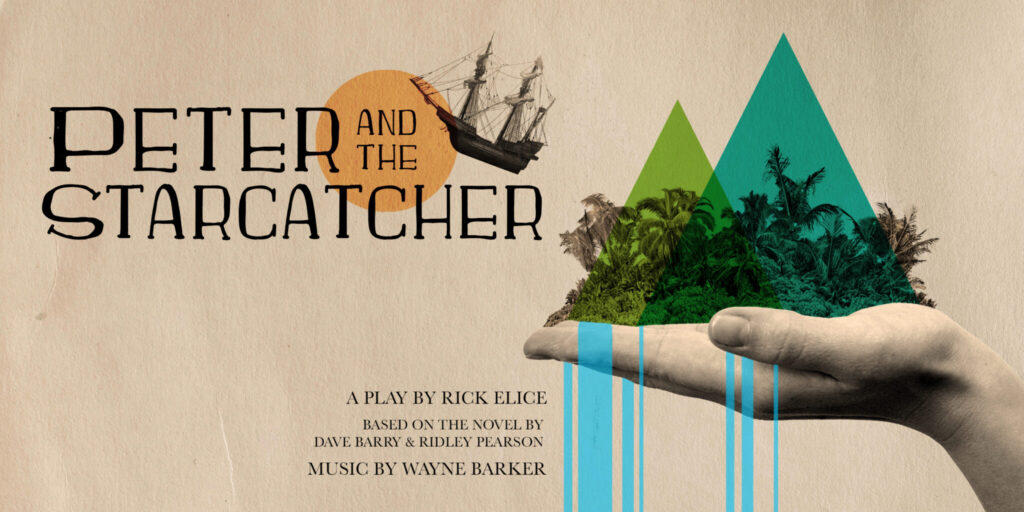
Some of the prominent themes in “Peter and the Starcatcher” include: Growing up and identity, friendship and loyalty, good vs. evil, legacy and inheritance, coming of age, leadership and heroism, and the power of storytelling.
Read more about the play here.
Class Connections:
- ADN 414: Color and Light
- AEHS 525: Family Relationships Over the Life Course
- ARS 257: Technology in the Arts
- COM 110: Public Speaking
- COM 112: Interpersonal Communication
- COM 457: Media and the Family
- ECD 310: Caldwell Fellows Honors Seminar: Foundations in Self-Development
- ECI 521: Teaching Literature For Young Adults
- ED 100: Intro to Education
- ED 150: Students Advocating for Youth I
- EDP 370 Applied Child Development
- ELM – elementary education department
- ELM 340 : Children Design, Create and Invent
- ELP 344: School and Society
- EMA 110: Introduction to Arts Entrepreneurship
- ENG 320: Anatomy and Physiology of Speech
- HON 398 Honors Special Topics
- STS 257: Technology in the Arts
Thompson Hall
What We Grew Up With
Nov. 2-5
Kennedy-McIlwee Studio Theatre
By KIRAN SOMA
Directed by Usha Bajpai
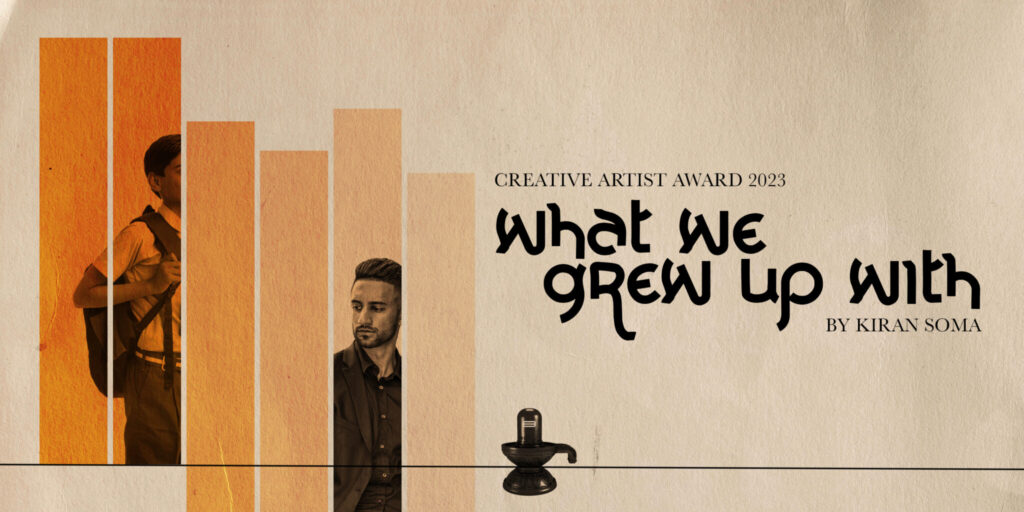
Winner of the 2023 Creative Artist Award in Theatre. Set in the United States post 9/11, What We Grew Up With follows an immigrant family and their experiences navigating racism, xenophobia, and estrangement.
Read more about the play here.
Class Connections:
- COM 200: Communication Media In A Changing World
- COM 250: Communication and Technology
- COM 395: Studies in Rhetoric and Digital Media
- COM 417: Communication & Race
- COM 441: Ethical Issues in Communication
- COM 457: Media and the Family
- ED 508 Exploring Diversity in Classroom and Community
- EMA 110: Introduction to Arts Entrepreneurship
- EMA 365: Foundations in Arts Entrepreneurship
- ENG 208: Studies In Fiction
- ENG 287: Explorations in Creatvie Writing
- ENG 288: Fiction Writing
- ENG 323: Writing in the Rhetorical Tradition
- ENG 330: Screenwriting
- ENG 388: Intermediate Fiction Writing Workshop
- ENG 488: Advanced Fiction Writing Workshop
- ENG 588: Fiction Writing Workshop
- ENG 590: Studies In Creative Writing
- HI 254: Modern American History
- PS 303: Race in U.S. Politics
- PS 432: Violence, Terrorism, and Public Policy
- PSY 311: Social Psychology
- PSY 411: The Psychology of Interdependence and Race
- SOC 203 Current Social Problems
- SOC 212 Race in America
- SOC 305 Racial and Ethnic Relations
- SOC 445 Inequality, Ideology, and Social Justice
- THE 103: Intro to Theatre
- THE 203: Theory and Practice of Acting
- THE 223: Stagecraft
- THE 303: Stage Directing
- WRT 111: Expository Writing
- WRT 114: Professional Writing, Research, and Reporting
Thank you to student intern John Craven, senior, for researching course connections!
Banned Books
Oct 3
Kennedy-McIlwee Studio Theatre
Directed by Danica Jackson
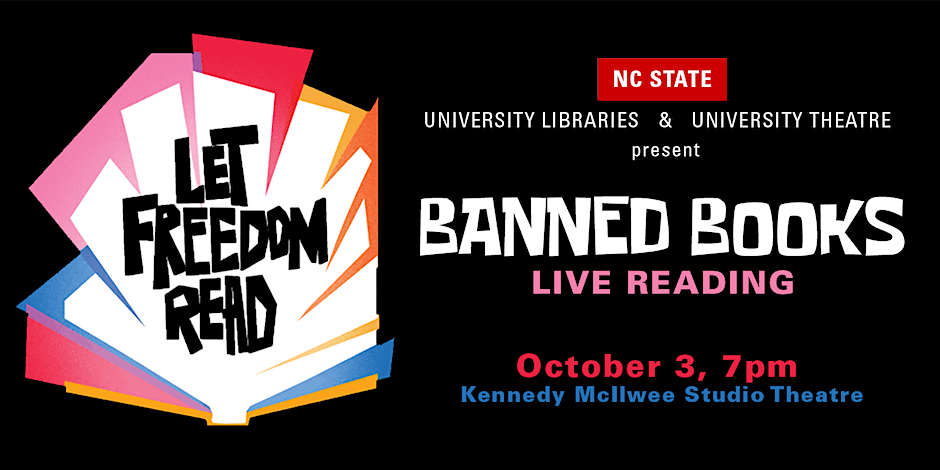
University Libraries and University Theatre present an evening of staged-readings of Banned Books.
Read more about the play here.
Titles Include
- Bruised Love by Nanette M Buchanan
- All Boys Aren’t Blue by George M Johnson
- The Curious Incident of the Dog in the Nighttime by Mark Haddon
- A Poem for Matthew Shepard by Margot Kelley Rodriguez (excerpt from October Mourning)
- The Hate U Give by Angie Thomas
- Perks of Being a Wallflower by Stephen Chbosky
- The Bluest Eye by Toni Morrison
- Bronx Masquerade by Nikki Grimes
- Beloved by Toni Morrison
- The Absolutely True Diary of a Part-Time Indian by Sherman Alexie
- Beyond Magenta by Susan KuklinI Know Why the Caged Bird Sings by Maya Angelou
Class Connections:
- AEHS 525: Family Relationships Over the Life Course
- AFS 342: Introduction to the African Diaspora
- AFS 344: Leadership in African American Communities
- AFS 346: Black Popular Culture
- AFS 442: Issues in the African Diaspora
- AFS 444: African American and African Women Leaders
- ANT 252: Cultural Anthropology
- ANT 254: Language and Culture
- CLA 320: Masterpieces of Classical Literature
- COM 110: Public Speaking
- COM 112: Interpersonal Communication
- COM 211: Argumentation and Advocacy
- COM 332: Relational Communication
- COM 362: Communication and Gender
- COM 392: International and Crosscultural Communication
- COM 395: Studies in Rhetoric and Digital Media
- COM 417: Communication & Race
- COM 441: Ethical Issues in Communication
- COM 442: Communication and Conflict Management
- ECD 310: Caldwell Fellows Honors Seminar: Foundations in Self-Development
- ECD 535: Introduction to College Counseling and Student Development
- ECD 536: Introduction to Clinical Mental Health Counseling
- ECI 305: Equity and Education
- ECI 405: Literature for Adolescents
- ECI 445: New Literacies, Emerging Technologies, and Electronic Portfolios
- ECI 521: Teaching Literature For Young Adults
- ED 100: Intro to Education
- ED 150: Students Advocating for Youth I
- ED 508 Exploring Diversity in Classroom and Community
- EDP 304: Educational Psychology
- EDP 370 Applied Child Development
- ELM – elementary education department
- ELP 344: School and Society
- ELP 515: Education and Social Diversity
- ENG 208: Studies In Fiction
- ENG 287: Explorations in Creative Writing
- ENG 288: Fiction Writing
- ENG 323: Writing in the Rhetorical Tradition
- ENG 388: Intermediate Fiction Writing Workshop
- ENG 488: Advanced Fiction Writing Workshop
- ENG 588: Fiction Writing Workshop
- ENG 590: Studies In Creative Writing
- HI 254: Modern American History
- HI 373: African-American History Since 1865
- HON 202: Inquiry, Discovery, and Literature (Transgression and Transformation in Women’s Literature)
- HON 295: Honors Special Topics-Social Science
- HON 297: Honors Special Topics – Interdisciplinary Perspectives/US Diversity
- HON 300: Race, Membership, and Eugenics
- HON 314: Society’s Mirror: Literature in 20th-Century America
- HON 398 Honors Special Topics: Practicing Happiness
- HON 398 Honors Special Topics:
- HSS departmentNew Fiction: Contemporary Issues in Literature
- PHI 221: Contemporary Moral Issues
- PHI 319: Black Political Philosophy
- PS 303: Race in U.S. Politics
- PS 309: Equality and Justice in United States Law
- PS 418: Gender Law and Policies
- PS 432: Violence, Terrorism, and Public Policy
- PSY 311: Social Psychology
- PSY 313: Positive Psychology
- PSY 411: The Psychology of Interdependence and Race
- PSY 431: Health Psychology
- PSY 432: Human Sexuality and Intimate Relationships
- SOC 203 Current Social Problems
- SOC 206 Social Deviance
- SOC 211 Community and Health
- SOC 212 Race in America
- SOC 301: Human Behavior
- SOC 304 Gender and Society
- SOC 305 Racial and Ethnic Relations
- SOC 306: Criminology
- SOC 400 Theories of Social Structure
- SOC 430: Community and Crime
- SOC 445 Inequality, Ideology, and Social Justice
- SSGK 295: Social Sciences and Global Knowledge Special Topics
- THE 103: Intro to Theatre
- WGS 200: Intro to Women’s, Gender, and Sexuality Studies
Thank you to undergraduate Maya McCall, arts outreach & engagement intern, who researched these connections.
Contact Amy Sawyers-Williams, arts outreach & engagement, to set up a connection (e.g. offer extra credit for your students who attend an event)! ; acsawyer@ncsu.edu
PAST SHOWS
Urintown
Feb. 23-26
Stewart Theatre
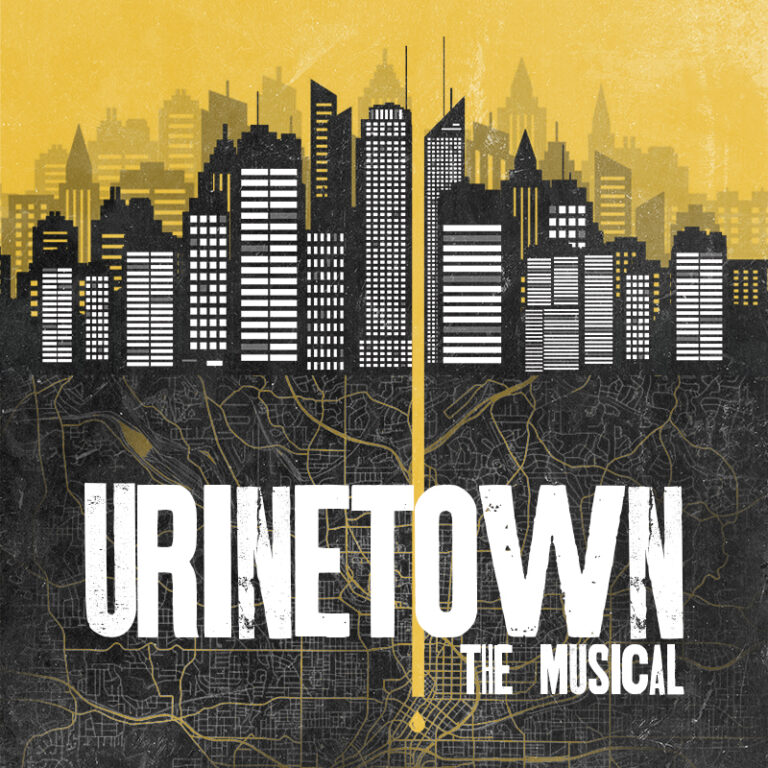
In a Gotham-like city, a terrible water shortage, caused by a 20-year drought, has led to a government-enforced ban on private toilets. The citizens must use public amenities, regulated by a single malevolent company that profits by charging admission for one of humanity’s most basic needs. Amid the people, a hero decides that he’s had enough and plans a revolution to lead them all to freedom!
This Meta-Theatre piece pokes fun at capitalism, populism, bureaucracy and musical theatre itself! This show boasts plenty of opportunities for physical comedy, dance, and dark comedy.
Read more about the play here.
Class Connections:
- ARS 351 / ARS 494 Arts, Ideas And Values / Special Topics
- FLE 401 Advanced Oral Communication in English for International Students
- HI 345 American Popular Culture
- HON 347 Freedom and the Self
- MUS 103 Theory and Musicianship I
- MUS 120 Introduction to Music Theory
- MUS 150 Vocal Techniques
- PHI 221 Contemporary Moral Issues
- PRT 200 Health, Wellness and the Pursuit of Happiness
- PRT 238 Diversity and Inclusion in Recreation and Sport
- PSY 311 Social Psychology
- PSY 416 Psychology of Emotion
- THE 103 Introduction to the Theater
- THE 203 Theory and Practice of Acting
Muse
Mar. 30-Apr. 2
Kennedy-McIlwee Studio Theatre
Written by GAVEN BELL
Directed by Mia Self
Winner of the 2022 Arts NC State Creative Artist Award
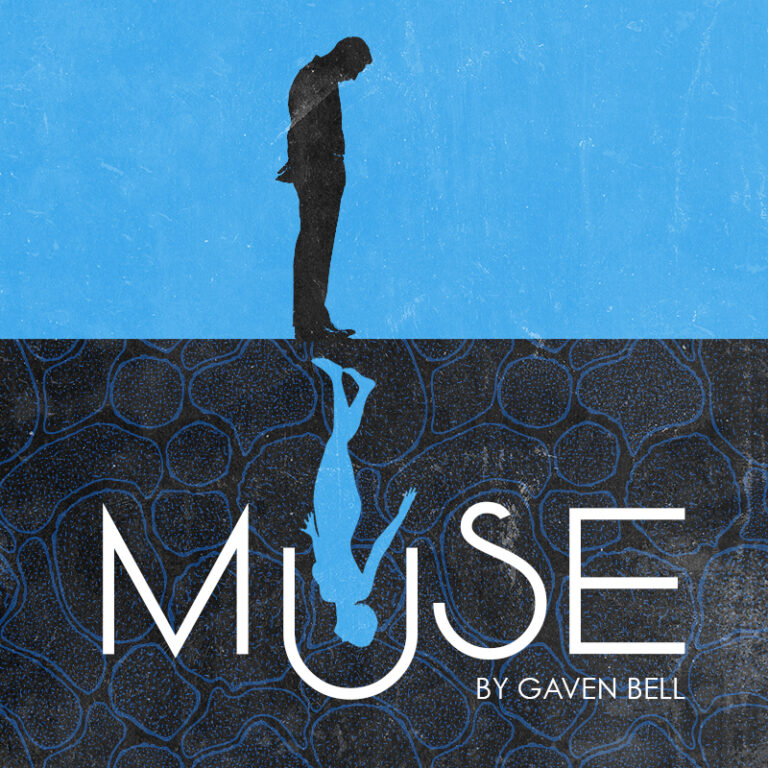
This 2022 Creative Artist Award-winning one-act play is a contemporary rendition of the Orpheus and Eurydice myth exploring the relationship between art and science as Finn, a microbiologist, grieves the loss of Eurydice, the artist no longer by his side.
Read more about the play here.
Class Connections:
- ARS 351 / ARS 494 Arts, Ideas And Values / Special Topics
- FLE 401 Advanced Oral Communication in English for International Students
- HI 345 American Popular Culture
- HON 347 Freedom and the Self
- MUS 103 Theory and Musicianship I
- MUS 120 Introduction to Music Theory
- MUS 150 Vocal Techniques
- PHI 221 Contemporary Moral Issues
- PRT 200 Health, Wellness and the Pursuit of Happiness
- PRT 238 Diversity and Inclusion in Recreation and Sport
- PSY 416 Psychology of Emotion
- THE 103 Introduction to the Theater
- THE 203 Theory and Practice of Acting